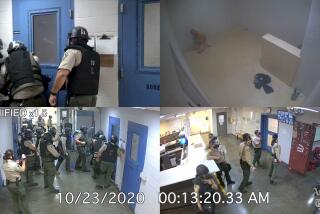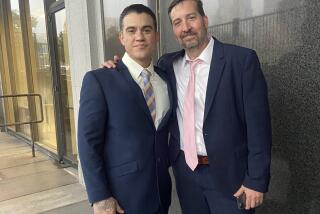Jury Convicts Woman of Killing Boyfriend
- Share via
The murder trial of Judy Valot was out of the ordinary: Without a body or weapon and only seven drops of blood as physical evidence, it presented many obstacles to proving that Valot killed her live-in boyfriend.
But jurors on Friday nonetheless voted to convict Valot, 42, of Irvine, of second-degree murder in the slaying of Peter Theriault, who disappeared in December 1998. It was only the fourth case in 30 years in Orange County in which a murder conviction was obtained without a body as evidence.
Relatives of Valot and Theriault wept after the verdict. Valot will be sentenced on March 24, and could get 15 years to life.
“It’s kind of like the end of a nightmare,” said Sue Fulbright, Theriault’s sister. “But it’s not quite ended until we find him.”
The prosecution had focused on what it called Valot’s unfounded jealousy to prove her guilt.
“The defendant was insanely jealous,” Deputy Dist. Atty. Debora Lloyd said. “She had a motive out of jealousy. She shot him and spent the next six days trying to cover it up. And she did a bad job.”
Valot’s daughter Victoria testified that her mother once pointed a gun at Theriault and said: “I wish I could kill you.”
The jury’s verdict ended what Theriault’s relatives described as two days on an “emotional roller coaster.” On Thursday, jurors told Superior Court Judge Frank F. Fasel that they had found the defendant guilty, but needed further clarification on the law to reach a verdict.
Friday’s deliberations were interrupted after the judge dismissed a juror because she had apparently been unwilling to continue deliberations. An alternate took her place, and the jury made a decision after an hour and six minutes.
Jurors explained that although they had been convinced that Valot had killed Theriault, they couldn’t convict her of first-degree murder.
“We didn’t have sufficient evidence to show that she had deliberated the murder,” said juror Bill Blackwell. “Everything for murder one fit except that.”
Defense lawyer Jeff Lund said he is likely to appeal the verdict; he filed a motion for a mistrial, which the judge denied, before jurors handed down the verdict.
“I believe that this jury has failed to deliberate properly,” Lund said, referring to the speed in which jurors reached a decision in the two-week-long trial.
More to Read
Sign up for Essential California
The most important California stories and recommendations in your inbox every morning.
You may occasionally receive promotional content from the Los Angeles Times.













